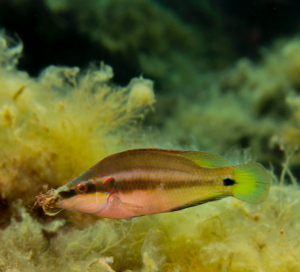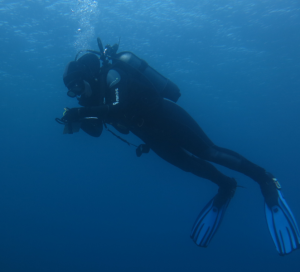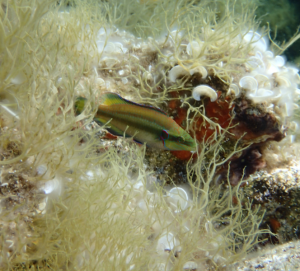The complex and puzzling mating system of the ocellated wrasse



Suzanne Alonzo has been studying the complex and often puzzling mating system of the ocellated wrasse (Symphodus ocellatus, Family Labridae) for over 20 years.
Ocellated wrasse males exhibit three alternative reproductive types: ‘nesting males’ provide parental care, defend territories, and form cooperative associations with unrelated ‘satellites’, who cheat by sneaking fertilizations but help by reducing sperm competition from ‘sneakers’ (who do not cooperate or provide care). These alternative types are fixed within but change between reproductive seasons (and are thus not due to a simple genetic polymorphism). We use behavioral observations, parentage analyses, field manipulations and rapid post-observation collection of blood and tissues to study reproduction in the ocellated wrasse (Symphodus ocellatus) from an evolutionary, behavioral, physiological, genetic, and transcriptomic perspective under natural conditions in the wild.
This research has made sense of a variety of otherwise puzzling behaviors, such as:
- Parental males are more likely to care for the young when more males have sired offspring in their nests (Alonzo and Heckman 2010).
- Female ovarian fluid influences the outcome of sperm competition (Alonzo et al. 2016).
- Females copy the mate choice of other females and avoid sneaker males, but seem to choose among nesting males at random (Alonzo 2004).
- Nesting males sometimes reject females that are trying to spawn in their nest (Alonzo and Warner 2000).
Want to know more? See the papers below (or a complete list HERE)
Nugent BM+, Stiver KA+, Alonzo SH, Hofmann HA. 2016. Neuroendocrine profiles associated with discrete behavioral variation in Symphodus ocellatus, a species with male alternative reproductive tactics. Molecular Ecology 25: 5212-5227 (http://dx.doi.org/10.1111/mec.13828)
Alonzo SH, Stiver KA+, Marsh-Rollo S. 2016. Ovarian fluid allows directional cryptic female choice despite external fertilization. Nature Communications 7:12452 (http://dx.doi.org/10.1038/ncomms12452)
Milazzo M, Cattano C, Alonzo SH, Gristina M, Rodolfo-Metalpa R, Sinopoli M, Spatafora D, Stiver KA+, Hall-Spencer JM. 2016. Ocean acidification affects fish spawning but not paternity at CO2 seeps. Proceedings of the Royal Society B 283: 20161021(http://dx.doi.org/10.1098/rspb.2016.1021)
Stiver KA+, Alonzo SH. 2013 Does the risk of sperm competition help explain cooperation between reproductive competitors? A study in the ocellated wrasse (Symphodus ocellatus). American Naturalist 181(3): 357–368 (http://dx.doi.org/10.1086/669149)
Alonzo SH, Heckman KL+. 2010. The unexpected but understandable dynamics of mating, paternity and paternal care in the ocellated wrasse. Proceedings of the Royal Society B 277(1678): 115-122 (http://dx.doi.org/10.1098/rspb.2009.1425)
Alonzo SH. 2008. Female mate choice copying affects sexual selection in wild populations of the ocellated wrasse. Animal Behaviour 75(5): 1715-1723 (http://dx.doi.org/10.1016/j.anbehav.2007.09.031)
Alonzo SH. 2004. Uncertainty in territory quality affects the benefits of usurpation in a Mediterranean wrasse. Behavioral Ecology 15(2): 278-285 (http://dx.doi.org/10.1093/beheco/arh007)
Alonzo SH, Warner RR. 2000. Allocation to mate guarding or increased sperm production in a Mediterranean wrasse. American Naturalist 156(3): 266-275 (http://dx.doi.org/10.1086/303391)
Alonzo SH, Warner RR. 2000. Dynamic games and field experiments examining intra- and intersexual conflict: Explaining counter-intuitive mating behavior in a Mediterranean wrasse, Symphodus ocellatus. Behavioral Ecology 11(1): 56-70 (http://dx.doi.org/10.1093/beheco/11.1.56)
Alonzo SH, Warner RR. 1999. A trade-off generated by sexual conflict: Mediterranean wrasse males refuse present mates to increase future success. Behavioral Ecology 10(1): 105-111 (http://dx.doi.org/10.1093/beheco/10.1.105)